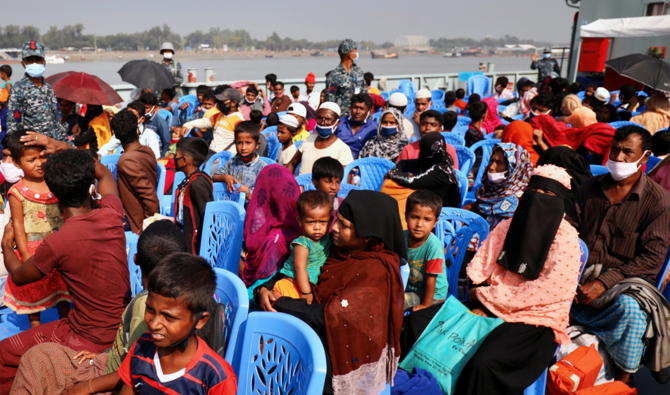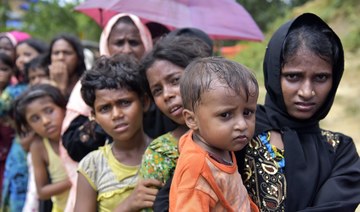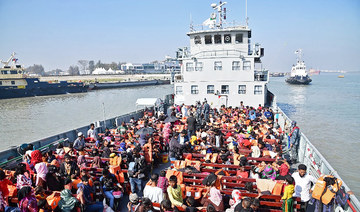DHAKA: Rohingya refugees at Bhasan Char island observed their first Eid Al-Fitr on Thursday, May 13, in an “isolated state” far away from their relatives.
Most of the people relocated to the new island facility left their friends and relatives in 34 camps at Cox’s Bazar, which is home for more than 1 million Rohingya refugees.
Bangladesh began the relocation of refugees, 18,000 to date, to Bhasan Char, some 63 km from the mainland, at the end of last year, explaining that it would ease pressure on the congested camps at Cox’s Bazar.
“We are observing a different kind of Eid this year, far away from friends and relatives. Usually we get together with relatives on Eid days,” Rohingya refugee Abdur Rahman, 37, told Arab News.
“On this special occasion, I am not seeing any friends and relatives around me. Sometimes I feel isolated.”
Rahman said: “Mobile phones are the only way of communication for us but it’s not always affordable.”
Another refugee, Morium Begum, 29, said her children are missing the Eid festivities in Cox’s Bazar.
“My children used to visit their friends’ houses and Eid fairs on these days at Cox’s Bazar. But here they don’t have any friends,” Begum told Arab News.
“Probably, the ongoing coronavirus lockdown added more to our isolation. Otherwise authorities may have allowed some Eid fairs for the children,” she added.
Mohammad Hossain, 19, said this Eid was a new experience to him. “The congregation field is prepared with makeshift tents and decorated in a befitting manner, which created much festivity on the island,” Hossain told Arab News. “I never saw this sort of arrangement in my days at Cox’s Bazar’s refugee camps.”
On marking Eid Al-Fitr, authorities have provided special food aid to the refugees on the island.
“A food package containing vermicelli, powdered milk, sugar, edible oil, rice, lentil, spices etc have been provided on the occasion of Eid,” Moazzam Hossain, Bangladesh’s additional refugee relief and repatriation commissioner, told Arab News.
“All the families received this aid according to their family size and need,” he said, adding that 5,000 new clothing items were also distributed to Rohingya children.
For maintaining social distancing and health and safety guidelines, authorities have organized three separate Eid congregations on the island.
“Since the beginning of the Rohingya exodus in 2017, this is the first time the refugees on the island got the opportunity to celebrate the Eid festival in a comfortable environment, free from the threat of landslides, rough weather and the highly congested environment of the Cox’s Bazar refugee camps,” Hossain added.
Emergency health services are also open during Eid, and there are eight government health officials currently serving on the island, he said.
UN and international aid agencies are yet to begin aid operations on the island.
Currently, more than 40 local NGOs are providing humanitarian support to the relocated refugees.
“Here the refugees are fully dependent on relief support, since there is no other source (of aid) on the island,” Saiful Islam Chowdhury, chief executive of Pulse Bangladesh Society, told Arab News.
“We made a need assessment for each of the families, and supplied aid accordingly, so that all of them can enjoy the festival,” he added.














